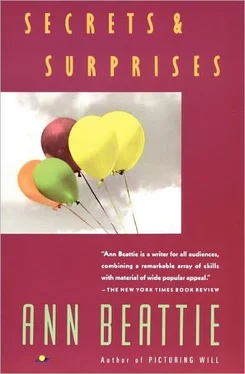Starley and Alice had been having a party — a party to which Alice had invited her important friends and to which Donald had not been invited — and Starley went out to get ice cubes. They were drinking mint juleps. (This gets crazier: they had all brought beach towels, were sitting around wrapped up in them with the heat turned up, pretending they were Arabs in the desert.) It was nine o’clock, around there, and Starley said they were running out of ice. (Correction: Alice said they were running out of ice, for which she will never forgive herself; yes, she realized that he, too, would eventually have noticed it. But if he had noticed five seconds later — probably one second later — the truck that went out of control would have passed that stretch of street Starley was crossing.) Starley had put on his black jacket and taken Alice’s scarf and, cold as it was, decided that the store was two blocks away, so he’d walk. (Alice, later, was sure that he had opened the door of the Fiat — his car was in the garage — and looked for the key under the floor mat — the one time she had left her key in the kitchen instead of in the usual hiding place. She was sure that he had tried to drive, had not found the key, had then and only then decided to walk. If he had taken the Fiat, he would be alive.)
The truck, a United Van Lines truck, its brakes not working properly as it came down the hill, and then the ice patch that threw it off course, right into him, on his way to buy ice cubes…
Donald heard all this when he picked up the phone. He could not really focus on the fact that Starley was dead; he could think only of himself, and the guilt he felt thinking, Hey — he’s dead and I’m alive. The guilt he felt thinking that if he had been invited to the party, he would probably have been the one to go for ice.
After Donald put down the phone (the anonymous voice having said, two times: “Come to the hospital for what?”) and he was standing there, disbelieving, the memory of the summer before with the whore making him smile and encroaching on his sorrow, the phone rang again. It was the woman who had been at his house earlier. It was Susan with her lovely, soft voice, calling to tell him she loved him. A few seconds after she hung up, wandering through his apartment, Donald was not clear what he had said to her. He knew that he should call her back, but he had no time. He was on the road, sad but full of purpose, an hour after both phone calls, headed for North Miami.
The drive took several days. The last night before he got there, he slept in a Howard Johnson’s, wanting to indulge all his maudlin instincts and be done with them. But this motel was not like the other one. The only room they had had one twin bed, and the room they had rented on the fishing trip had been much larger, with two double beds. This motel was loud. People in the next room sang along with a singer on television, other people joined them, they had a party. Donald stood staring out the window (no balcony off this room) at the pool, flat and blue, just a little too far away to be inviting, the night a little too cool for swimming.
From a phone booth on the highway that afternoon he had called his boss. His boss had met Starley at a party at his apartment once, but said he didn’t remember him.
“I flipped,” Donald said. “It made me realize that while I was alive there were things I had to do. Please don’t fire me.”
There was static on the line; a bad connection. His boss was placating: of course he wouldn’t fire him, but when did he think — (cars roared by). They hung up, both joking about Florida oranges.
He had tried to call Joanna from another phone later on, to say he was coming. There was no answer. He tried to call Susan, but of course she was at work, no answer there either. With the back of his arm he wiped the sweat off his forehead. What the hell had his boss been joking about — what was funny about Florida oranges?
Joanna’s house was only a ten-minute drive from the highway. It was a small pale-green house. The lawn was full of exotic bushes. In front of the house a pink 1955 Cadillac convertible was parked. The upholstery inside was white, in perfect condition. Whose was it?
He went up the walk and knocked on the doorframe of the screen door. A girl came to the door when he knocked.
“What do you want?” she said.
“Does Joanna still live here?”
“Yeah. Who are you?”
“I’m Bobby’s father.”
“What do you mean?” She looked confused. She put her face closer to the screen. Her eyes were large, like Anita’s. She was prettier. Older.
“I’m his father. I came to visit him.”
He snapped his arms into his sides. He had been standing there like a bear, leaning forward, arms away from his body.
“What does he look like?” she said.
“He has medium-length brown hair. He has braces. Wait a minute — he was getting braces when I was last here, but I don’t know if he got them. He looks like me. Don’t you see the resemblance?”
“Yeah,” she said. “Come on in.”
“Who are you?” Donald said. “Where are they?”
“Bobby’s gone over to a friend’s house. I’m waiting for him to get back. Your wife is playing volleyball.”
“Where?” he said.
“Do you know the Orrs?”
“No.”
“She’s there.”
They stood facing each other. She had a cigarette in her mouth and was about to light the filter.
“It’s to surprise them,” he said. “They didn’t know I was coming.”
“Oh,” she said.
“Wrong end,” he said, reaching out to touch her hand before she could touch the lighted match to the cigarette.
The television was on, but she had turned down the volume before opening the door. Red Skelton was gesticulating, his face expanding and contracting as if it were made of putty.
“If you’re going to be here,” she said, “I might as well go.”
He nodded. She was going down the walk when he remembered about paying her. She turned around when he called after her and cocked her head. “Pay me?” she said. “Joanna’s my friend. I watch Bobby and she watches my daughter.”
“You have a daughter?” he said.
“Yes. I have a four-year-old daughter.” She smiled, deciding to be more friendly. “Her father is watching her. They went to the beach. I just live three streets over.”
She waved. She went out to the car and started it. The radio came on when the car started. It was a fine car: in perfect shape, motor idling quietly, paint sparkling. She waved again. Donald waved. She was gone.
He walked into the kitchen to look for a drink, realizing that he was not only tired but depressed. Depressed that he didn’t know one friend of Joanna’s and that the one he had just met was by accident. Maybe it wasn’t one of her close friends. How could she be a close friend if she didn’t even know that Joanna had never married. But maybe Joanna had told people she was divorced, for Bobby’s sake. For Bobby’s sake he would have married her, but she wouldn’t do it. They had argued about it, but he couldn’t change her mind. She lived in an apartment in New York with three other girls — a tiny apartment on the East Side. When she was three months pregnant she started bleeding. She called the doctor and he told her to go to bed. She and Donald jogged around Central Park. They danced the Virginia reel in his apartment as best they could, because that apartment was only slightly larger than hers. They sat in a bar and she said, “Everything’s okay. Everything’s going to be okay.” The bleeding stopped. They jogged again, every night for a week, running like maniacs. Bobby was born six months later, in Florida. She had gone there because she had friends in Florida, and because he would not stop pestering her to marry him. Bobby was born one week before Donald’s birthday. One of her friends called him at work to tell him. Ironically, after she described the baby, she said, “Everything’s okay.” She told him that Joanna did not want to see him, that when she was ready she would call. No call.
Читать дальше












